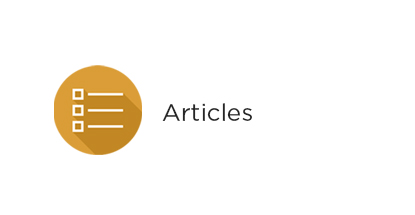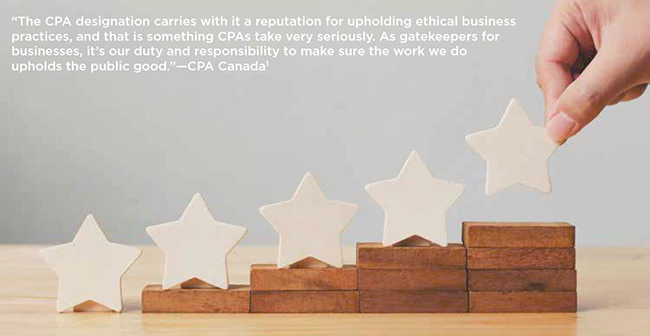
- What are the rules?
- Improper certifications outside CPABC
- Plagiarism and academic dishonesty
- Final thoughts
- Do you need guidance?
- Comments or questions about this article?

A professional’s reputation is a fragile thing.2 Vigilance is needed to safeguard your standing in the profession and the community, because all it takes is one careless decision—often made in the spur of the moment—to damage your reputation.
A good reputation starts with trustworthiness. The CPA profession typically scores well in public surveys when it comes to trustworthiness, with CPAs ranking alongside other well-respected professionals such as teachers and medical practitioners. To maintain this public trust, CPAs must keep integrity top of mind. Every day we face ethical challenges—whether big or small—in our personal and professional lives, and how we respond to these challenges largely determines whether we’re held in high esteem by our friends, peers, clients, and the general public.
CPABC’s professional conduct department sometimes encounters members who’ve made serious errors in judgment in their oral statements or written representations. This article discusses the consequences to a member’s or student’s3 reputation and professional standing when they do not meet the profession’s standards of conduct.
What are the rules?
Rule 205 of the CPABC Code of Professional Conduct (CPA Code) states that a CPA must not:
- Sign or associate with any letter, report, statement, representation, or financial statement they know, or should know, is false or misleading (whether or not the signing or association is subject to a disclaimer of responsibility); or
- Make or associate with any oral report, statement, or representation they know, or should know, is false or misleading.
Rule 205 applies to all of a CPA’s professional dealings. It also applies to situations that reflect on the reputation of the accounting profession. Another closely related rule, Rule 201.1, states that CPAs must “…act at all times with courtesy and respect and in a manner which will maintain the good reputation of the profession and serve the public interest.”
CPABC relies on members’ honesty and integrity to maintain the profession’s good reputation. Many CPABC services and programs also rely on individuals telling the truth in written representations and declarations. For example:
- CPABC members must report continuing professional development (CPD) annually;
- Public practice applications require prospective licensees to attest to the nature and extent of their experience and expertise; and
- Members applying for fee reductions must certify their financial situations.
In our experience, members are rarely dishonest in applications and certifications to CPABC. In the rare instances where members have not been truthful, there have been serious consequences. Here are two examples4:
- A member living abroad certified to CPABC that they were exempt from CPD requirements in British Columbia because they earned their CPD in their jurisdiction of residence, where they claimed to be a member by affiliation. CPABC subsequently learned that the member’s affiliation with the other jurisdiction had lapsed years earlier. The member resigned rather than face discipline in BC.
- A member certified that they were a student’s supervisor for the purposes of assessing the student’s work experience for a CPA membership application. When questioned about it later by CPABC, the member admitted that they had signed the certification in blank, allowing the student to complete the document however they saw fit. When the student inserted false information, the member implicitly became a party to this falsification. The student was accepted as a CPABC member based on this false information and resigned in the face of discipline when the deception was exposed. The member faced significant sanction for their part in the fraudulent membership application.
Improper certifications outside CPABC
Most of us have probably clicked “I agree” to lengthy software user agreements when we have not fully (or even partly) read the fine print. In a work context, however, similar behaviour can land a CPA in significant hot water. For example, the Law Society of British Columbia requires all CPAs who complete trust account reports for lawyers to certify that they’ve read the instructions beforehand. CPABC has encountered several situations in which members have falsely certified that they’ve read the instructions, as evidenced by the work they produced. In these instances, CPABC has sanctioned the individuals for improper certifications and shoddy work.
Outside of work, CPAs should also exercise caution when they make regulatory declarations of any kind. For example, one of CPABC’s legacy accounting bodies began a disciplinary proceeding against a professional who lied to border customs officials about travelling on vacation and having “nothing to declare.” In fact, the member was travelling on business and had substantial merchandise in their possession. Because this behaviour was seen to damage the good reputation of the profession, it triggered disciplinary proceedings. The individual resigned their membership in the face of disciplinary action.
Plagiarism and academic dishonesty
The CPA Code applies to students as well as members. The guidance to Rule 205 states that “plagiarism and other forms of academic dishonesty are examples of association with false or misleading representations.” If a student is found in contravention of Rule 205, sanctions could result in expulsion from the CPA program.
Final thoughts
Alex Lickerman, CEO of ImagineMD, puts it well: “A good reputation shouldn’t be an end in itself but rather a natural outgrowth of your striving to be the person you most want to be.”5
The public holds the CPA profession in high esteem because of our reputation for honesty and integrity in everything we do. Most of us strive painstakingly to develop and maintain this good reputation. Don’t allow a moment of weakness to throw that all away.
Do you need guidance?
CPABC has professional standards advisors who are here to help you understand the CPA Code. All discussions are confidential, non-binding, and unofficial. Contact the Professional Conduct department.
In complex situations, you may also want to consider obtaining independent legal counsel.
The Chartered Professional Accountants Act, CPABC Bylaws, CPABC Bylaw Regulations, and CPABC Code of Professional Conduct can be accessed online at bccpa.ca/regulatory/act-bylaws-rules.
Comments or questions about this article?
Contact the Professional Conduct department.
Footnotes
- “Look up! It’s a Bird, It’s a Plane—No, It’s a CPA!” cpacanada.ca, June 13, 2018.
- Alex Lickerman, MD, “The Value of a Good Reputation,” Psychology Today, psychologytoday.com, April 22, 2010. Accessed January 25, 2019.
- In this article, “student” refers to either a candidate enrolled in the CPA Professional Education Program or a student taking the CPA preparatory courses or pursuing the Advanced Certificate in Accounting and Finance.
- Some details have been changed to ensure anonymity.
- Lickerman, “The Value of a Good Reputation,” Psychology Today, psychologytoday.com, April 22, 2010. Accessed January 25, 2019.
Rate this Entry
Current rating: 0 yes votes, 0 no votes

